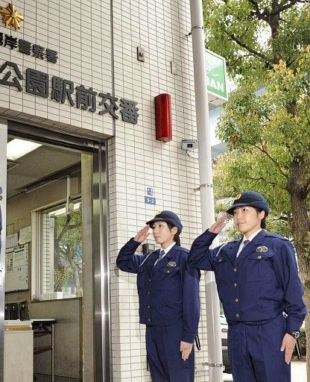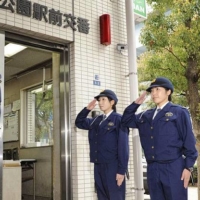Osaka – Imagine it’s late at night and you just got off the train, ready to head home. You go to the bike rack, pull out your bicycle, hop on and start pedaling. The night breeze is refreshing, and you know you’ll be home in no time.
Then, you get flagged down by the 警察 (keisatsu, police).
自転車の窃盗は、窃盗の中でも特に多い犯罪の一つ (Jitensha no settō wa, settō no naka demo toku ni ōi hanzai no hitotsu, As for bicycle theft, among thefts [in Japan] it is one of the most common crimes), so if you get stopped by a 警官 (keikan, police officer), it could be nothing more than a mildly annoying check to see if your 登録シール (tōroku shīru, registration seal) matches the information on your ID.
With the Olympics taking place next week, though, there’s a good chance that what is called 職務質問 (shokumu shitsumon, ID check/police inquiry) will increase — whether you’re on a bike or not.
While non-Japanese residents generally have positive things to say about Japanese police officers, there is still no shortage of stories of those who have had the opposite experience, with 人種差別 (jinshu sabetsu, racial discrimination) possibly playing a part.
Interactions with the police can be intimidating at times, and thus not the easiest situation in which to practice your Japanese. To make the process run smoother, it’s good to know what an officer might say in advance so you can respond to their questions.
Let’s take a look at the bike check scenario, since it is one of the most common. To get your attention, the first thing an officer might say to you is: すみません、ご協力お願いします (Sumimasen, go-kyōryoku onegai shimasu, Excuse me, can I have your cooperation, please?). The officer may also identify themselves as being 防犯パトロール中 (bōhan patorōru-chū, on security patrol).
This might be followed by follow-up questions like, どこに向かっているんですか (doko ni mukatte-iru-n desu ka, where are you headed) or どこに行くところですか (doko ni iku tokoro desu ka, where are you going)?
The officer will then want to confirm who owns the bicycle: 自転車の登録番号を確認させてください (Jitensha no tōroku bangō o kakunin sasete kudasai, Please let me confirm the bicycle’s registration number) and follow up with, あなたのものですか (anata no mono desu ka, is it yours)?
It could be tempting to just roll your eyes, but just know that sarcasm doesn’t go down well with the police. Stay calm, be polite and respond with a simple, はい、そうです (hai, sō desu, yes, it is).
If you do not appear to be Japanese to the officer, there’s a good chance the officer will take the opportunity to check your 在留カード (zairyū kādo, residence card) — which, by law, you should have on you at all times (or some other form of 証明書 [shōmeisho, identification] like a passport). Showing it to them will be the fastest way to conclude the situation.
If the officer would like to take the 職務質問 further, they may ask you to go to the 交番 (kōban, police box) with them: 交番でお話させてもらえますか (Kōban de o-hanashi sasete-moraemasu ka, Would you let me talk to you about this at the police box)?
Moving the conversation to the 交番 is slightly more formal. This is where it is good to know your rights when it comes to 職務質問. Article 2 of the 警察官職務執行法 (keisatsukan shokumu shikkō hō, Police Execution of Duties Law) states that there are two conditions in which the police can stop and question you. First, there must be 何らかの犯罪を犯し、若しくは犯そうとしている疑い (nanraka no hanzai o okoshi, moshikuwa okosō to shite-iru utagai, suspicion that a crime has been, or is about to be committed).
Second, 既に行われた犯罪について、若しくは犯罪が行われようとしていることについて知っていると認められる者 (sude ni okonawareta hanzai ni tsuite, moshikuwa hanzai ga okonawareyō to shite-iru koto ni tsuite shitte-iru to mitomerareru mono, if you are someone who can admit that they know about a crime that has been committed, or is about to be committed).
You could try asking, 私は何か怪しいことをしましたか (watashi wa nani ka ayashii koto o shimashita ka, did I do something suspicious)? But just know that this is where the conversation could veer off routine police check scripts. The Japanese authorities are not that used to people defying their requests during such a routine check.

At the 交番, you may be asked, バッグの中見せてもらえますか (baggu no naka misete moraemasu ka, can you show me the inside of your bag)? If you don’t want an officer searching your things, you can ask if compliance is optional, 任意ですか (nin’i desu ka, is this optional/voluntary)? Or you can refuse by saying, 令状がなければ、お断りします (reijō ga nakereba, okotowari shimasu, without a warrant, I refuse). Again, doing so may make you look 怪しい (ayashii, suspicious) to the officer you’re speaking to.
Finally, if you feel like you are being harassed then you can ask the officer to see their police ID: すみません、警察手帳を見せてください (Sumimasen, keisatsu techō o misete kudasai, Excuse me, please show me your police badge). The officer has a legal obligation to show you their ID, and doing this will ensure personal accountability in the case that an abuse of power is taking place. While not as common as overseas, more people in Japan are filming such encounters in order to keep the police accountable.
A visit to the 交番 might not necessarily be a negative experience, though, Japanese police officers are, of course, there to help people. If you need to report a crime or accident, call 110 to contact the police. If you need to ask for directions, or you’ve found an 落し物 (otoshimono, lost item), then going to a 交番 is the better choice. Finding them isn’t difficult, and sometimes you’ll see a 地域警察官 (chiiki keisatsukan, community police officer) standing outside with a 警杖 (keijō, police cane).
This duty is known as 立番 (ritsuban, stand guard) and it’s the basis of Japanese-style community policing, which emphasizes close engagement with residents. By making themselves visible, the police become more accessible to civilians who might need help, while also deterring those with 犯意 (han’i, criminal intent).
You may even want to 苦情を届ける (kujō o todokeru, file a complaint) about your unpleasant experiences with the police. In this case, you may want to head to your local 警察署 (keisatsu-sho, police station) and tell the front desk, 私は警察から理不尽な職務質問を受けました (watashi wa keisatsu kara rifujinna shokumushitsumon o ukemashita, I’ve experienced an unreasonable police check).
Surprisingly, it has been done before with a fairly positive outcome that involved an apology and the police chief offering their personal phone number.
Although it’s difficult to expect other police chiefs to take the same course of action, it’s a small step forward that acknowledges there is a problem. And knowing the right vocabulary may help spread the word for any necessary systemic change in the future.
In a time of both misinformation and too much information, quality journalism is more crucial than ever.
By subscribing, you can help us get the story right.
SUBSCRIBE NOW




